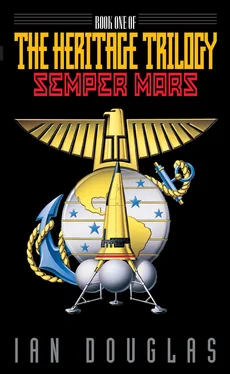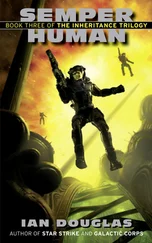Gray touched the turn-page corner of the PAD. “How big an operation is this?”
“The logistics are laid out on page five,” Warhurst said. “I’m suggesting one platoon, twenty-three men. Plus an HQ element. Thirty men in all.”
The admiral paged through several more screens. “Very complete.” He looked up at Warhurst, one white eyebrow askance. “And it’s certainly topical. But you can’t be serious.”
Warhurst reached across the desk and tapped a touch-point on the Personal Access Device. There was a moment while the PAD searched for the office’s network channels, and then the flatscreen behind the admiral’s desk flashed to a new set of uploading images. Gray swiveled in his chair to watch the display, which tinted the room with its ruddy glow.
Red sand and ocher stones littered an uneven, rolling ground as far as the eye could see, beneath a sky gone eerily pink and wan. An American flag hung from a mast in front of a cluster of pressurized domehuts, a tiny symbol of national defiance stirring listlessly in the thin wind. On the horizon, miles away but looming large enough to seem much closer, was the mountain. It reminded Warhurst sharply of Ayers Rock in the Australian outback, monolithic, vast, and red in the distance-chilled sunlight. The surface was sand-polished and smooth, its original angles, planes, and swellings worn down by the wind erosion of five hundred millennia, but the features were still discernible.
Or so some said. There were still voices—and powerful ones, at that—insisting that the so-called Cydonian Face, the Face on Mars, was a natural feature, a kind of cosmic prank elicited by shadows, coincidence, and the irrepressible human will to believe.
This despite the latest reports from Cydonia Base.
“In five more months,” Warhurst said, “Columbus will cycle past Mars and deliver her payload. They used a sealed hab payload, as was their right by the International Space Commerce Treaty…but Intelligence tells us the passengers include fifty soldiers of the Second Demibrigade, Legion Étranger—French Foreign Legion—in the service of the United Nations. That’s more soldiers than we have scientists on Mars, right now…and they’ll be armed, where our people are not.”
Admiral Gray turned away from the flatscreen, scowling. “I needn’t remind you, surely, that the administration is fighting for its life, right now. And trying like the devil to keep a low profile where the UN is concerned.”
“I’m well aware of our current…foreign policy,” he replied. The way he said it added the words lack of in front of the word foreign.
“And how is sending thirty US Marines to Mars supposed to defuse a situation that is just a step or two short of outright war?”
“Maybe it doesn’t,” Warhurst said. “But maybe the president would like an option that doesn’t have us ducking for cover every time some two-bit dictator in South America or Asia sneezes and blames us. Maybe stationing troops on Mars to safeguard our interests—and we’re still allowed to do that, I remind you, under the charter—maybe that would convince Geneva to back off and cut us some slack.”
Gray tapped several touchpoints on the PAD. The image of America’s xenoarcheological station on the bitterly cold and windswept Cydonian plain remained on the wall flatscreen, but Warhurst’s proposal came up on the PAD display. “Hmm. And, just incidentally, it ingratiates the Marines with the American public, eh?”
“Maybe the American public is tired of getting kicked around by those two-bit dictators, too, CJ.”
“Maybe. And maybe Congress won’t want to shut down the Marine Corps while thirty Marines are on their way to protect our people on Mars.” Suddenly, he grinned, a cold and lopsided showing of teeth. “My God. SECDEF and State are going to shit their pants when they see this.” He paused and shook his head. “Damn it, Monty, why the stick up your ass? Maybe Archy and the rest are right, and it’s time to let the Corps retire, with dignity. With honor. Warfare has changed in the last century, you know…or haven’t you been paying attention? Marine amphib ops like Inchon and Tavrichanka are things of the past. We’ll never see a major amphibious landing again, not when satellites and space stations make secrecy impossible in any deployment. Do you want the Corps to end up as nothing more than the Navy’s police force?”
“There are still a few things us Marines do that the other services don’t,” Warhurst replied. He looked down at the desk top for a long moment. “I’ll tell you, though, CJ. The reason, the real reason, doesn’t have that much fact or experience or science behind it. You know I have a son in the Marines. Ted’s planning on making it his career. And his son, my grandson, Jeff. Eleven years old. He commed me just the other day to tell me he was going to be a Marine. Like his daddy. Like me. What the hell am I supposed to tell him, CJ, if they kill the Corps? The tradition? It would be like killing part of who we are.”
Gray sighed. “There aren’t any easy answers, Monty. You know that. The UN is pushing, pushing hard, to reduce all national militaries to a minimum.”
“I’ll let the politicians worry about disarmament,” Warhurst said. “What I don’t want to see is my son’s face…or Jeffie’s, when I have to tell them that the Marines are being shut down, that their country doesn’t need them anymore.”
“A hell of a note,” Gray said, “proving we need them by sending them to Mars.”
“The Marines,” Warhurst replied, “always go where they’re needed.”
WEDNESDAY, 9 MAY
Cycler Spacecraft Polyakov,
three days from Mars Transfer
1517 hours GMT (shipboard
time)
This wasn’t the first time the Marines had ventured into space, not by a long shot. On February 20, 1962, Colonel John Glenn, United States Marine Corps, had become the first American in orbit, thundering into space atop a primitive Atlas-D booster. Of course, Navy astronauts were quick to point out that Alan Shepard, a former US Navy aviator and test pilot, had been the first American in space nine months earlier, even if his suborbital flight—with a full five minutes in zero G—had also been the shortest spaceflight in history.
Major Mark Alan Garroway did not think of himself as an astronaut, even though he’d been in space for seven months, was drawing astronaut’s flight pay, and was watching now as Mars drifted past the command center’s main viewport. He was a passenger—in effect, he was extremely expensive cargo—aboard the Polyakov, one of four cycler spacecraft set to shuttling between Earth and Mars in the past decade. He was a Marine, and as far as he was concerned, sharing bridge watches with the ship’s three officers—two Russians and an American—did not make him an astronaut. That distinction was reserved for the glory boys and girls of NASA’s Astronaut Corps and the Russkii Kosmonaht Voiska. Marines liked to boast that every Marine was a riflemen first, and that any other job description—whether that of AV-32 pilot or combat engineer, of electronics and computer specialists like Garroway or the goddamn commandant of the whole goddamned Corps—was at best a minor elaboration.
Garroway was still less than enthusiastic about this mission, even after seven months in space. The routine had swiftly become tedious, especially after the magnificence of the blue and cloud-smeared Earth faded to nothing more than a brilliant, blue-white star. It was the sameness of life aboard ship, day in and day out, that ground away at his nerves, convincing him that this time, finally, once and for all, when the mission was done and he got back home, he was going to retire from the Corps at last. That tour-boat concession in the Bahamas was looking better and better with each passing watch. Kaitlin, his daughter, had been accusing him of going soft, lately, in her frequent v-mails. Well, maybe she was right. It was hard to stay gung ho for twenty-five years in a Corps dying of slow starvation…and with nothing much to show for it but a ticket to Mars and a hell of a long tour away from home.
Читать дальше












